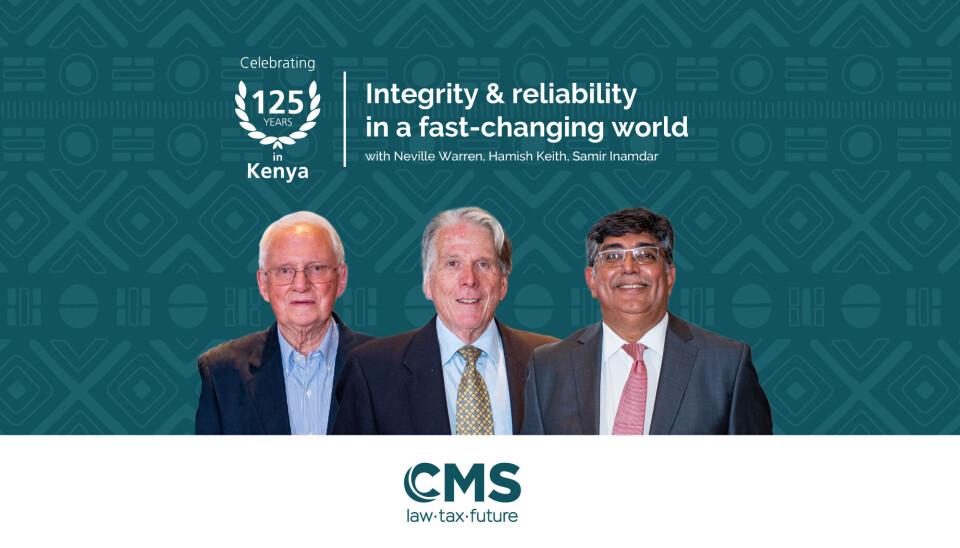The values that guided East and Central Africa’s oldest law firm through 125 years of political and economic changes will continue to be key as CMS Kenya | Daly Inamdar (CMS Kenya) navigates modern challenges in the coming decades, say past and present leaders Neville Warren, Hamish Keith and Samir Inamdar.
“I would say it’s summed up in one word: integrity,” said Neville, who joined the firm that’s now CMS Kenya as a young solicitor from England in 1958, and served as senior partner throughout the 1990s and 2000s. “We always did our best to look after our clients’ interests.”
The importance of ethics and integrity was echoed by Samir, the firm’s current managing partner, and Hamish who served as the senior partner through key mergers and a period of strong growth in the last three decades.
“It’s about being a professional in the true sense of the word,” said Samir. “Being straight with any court, client or institution you interact with; straight and honest in terms of what you do.”
The challenge for CMS Kenya now and in the decades ahead is to continue to be relevant and reliable in the face of rapid shifts in business, technology, client expectations, staff ambitions and growth in the legal landscape, noted Hamish. “Fifty years ago, when I began in Kenya, it was primarily multinationals that we were dealing with here – and some local businesses that weren’t very big. Over the years our economy has changed; it’s now very much Kenyan-driven. The business community and the expectations and experiences of Kenyans have changed.”
Celebrations for CMS Kenya’s 125th anniversary took place in late September, alongside the CMS Africa Academy which they hosted. There, young lawyers from across the CMS network gathered to learn about and practice soft skills, including improving service delivery, collaboration, leadership, and to find out more about AI’s impact on the legal landscape.
President of the Law Society of Kenya, Faith Odhiambo, praised CMS Kenya “for not only surviving, but thriving”, and for setting “a precedent for sustained excellence” over its many decades of existence.
The firm’s roots can be traced to two Irish lawyers, OB Daly and EK Figgis, who opened the country’s first law firm in Mombasa on 11 October 1899, before relocating to Nairobi when a new railway developed. Neville, Hamish and Samir note how the firm has grown alongside the development of Kenya, with the foundations for a modern, future-focused CMS Kenya built over more than a century as Kenya evolved from protectorate to colony to independent state and now a fast-growing dynamic business environment.
When Neville came to the country in the late 1950s, and Hamish in the 1970s, most law firm partners were Europeans. Both are proud of how the firm helped lead the way in developing local lawyers, especially black and female lawyers, guiding them from pupils to senior levels both within the firm and to leadership elsewhere, such as the high court where some became judges.
“One of the great things we were able to achieve was making the firm the most multicultural at the time,” Hamish said. “We had more women lawyers than men, were the most advanced, and worked very hard to make sure we had good cultural representation; the first really diverse firm in the country.”
In 2016, Daly & Figgis merged with another of Kenya’s leading firms, Inamdar & Inamdar, which was established in 1926. Three years later they joined with European powerhouse CMS, coupling international support systems, technology and processes with deep local knowledge and expertise. Samir says this latest development is working very well, and, with a pioneering history and exciting future, there’s certainly plenty for CMS Kenya to celebrate.

